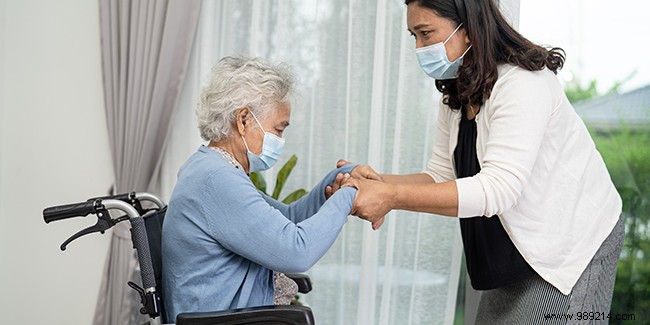
Between 8 and 11 million people in France take care of a loved one with a loss of autonomy or a disability on a daily basis, as indicated by the Ministry of Solidarity and Health. They are called helpers. Their day-to-day role is often a source of exhaustion and isolation as it is difficult to listen and help people who are sick or who can no longer perform daily activities alone. Caregivers are most often invisible, even though their role is essential in keeping their loved ones at home. This is why many associations have been created to support caregivers in different ways.
The term "caregivers" refers to people, most often women, who come to the aid of a dependent or disabled relative, in particular an elderly person, on a regular and frequent basis, and in a non-professional capacity. Most caregivers are spouses and almost 20% other family members.
Caregivers are now legally recognized despite having been invisible for a long time despite the very important role of support, assistance, listening, etc. that they play. Missions that they most often take on alone, while they allow people with a loss of autonomy to be kept in their homes for as long as possible. The status of carer was thus legally recognized with the law on the adaptation of society to aging voted in 2015.
This status now allows caregivers to benefit in particular from respite solutions that allow them to breathe a little, take care of themselves, and meet their daily life requirements.
Despite this recognition by society, many caregivers are forced to put their professional and personal life on hold to devote themselves to their dependent loved one. A role that also often compromises their health and well-being. To support caregivers in their missions, there are a number of associations that are available to support them.
Caregivers are not health professionals or psychology specialists. To be as well equipped as possible in front of a loved one with a loss of autonomy whom they care for every day, to understand how it works and above all to help it, caregivers need information, in particular on the health problems encountered by their loved ones. . Several associations offer them specific training. Here are some examples.
France Alzheimer is particularly aimed at carers of elderly people with Alzheimer's disease or a neurodegenerative disease. This association organizes in particular for them training courses led by psychologists whose objective is to provide information on Alzheimer's disease, concrete tools to understand the sick person and adapt his support, as indicated by the association. .
To register for these courses, interested carers must fill out a form on the association's website, francealzheimer.org.
Many caregivers take care of a loved one with Parkinson’s disease on a daily basis. In order to better know and understand this disease and its evolution, the France Parkinson association has notably developed an online learning platform, called "FormaParkinson". These are distance learning courses. The association also offers face-to-face training for caregivers throughout France. Their program is available on the association's website, franceparkinson.fr.
Always with the aim of informing carers, but also to help them in their role of supporting a loved one with a loss of autonomy, the Union des Bistrots Mémoire association also organizes training courses for carers in many departments. Their contact details are available on bistrot-memoire.com, the association's website.
Caregivers are often alone because they are too busy with the loved one they help on a daily basis. Associations exist to promote exchanges between carers and share their experiences.
This association has given itself the mission, as it indicates, of "accompanying all caregivers without distinction linked to the age and pathology of the person accompanied; to promote a vision of the role and place of the helping in its double dimension:the link to the accompanied person and the link to society; and to contribute to bringing out the societal dimension of the theme of carers, beyond the private dimension".
The French Association of Caregivers organizes in particular the "Caregivers' Cafés" which are places, times and spaces for information and which take place in many cities in France. Their list is available on the association's website, aides.fr.
In order to support them, the French Association of Caregivers also organizes "Health Workshops" intended to discuss and learn about the health impacts of accompanying a loved one on a day-to-day basis.
The association La Compagnie des Aides aims to develop mutual aid and exchanges between caregivers, as indicated on its website lacompagniedesaidants.org. To this end, it provides them with a network, advice, listening or practical information thanks to numerous tools such as a directory of caregivers, videos, etc.
Being able to set aside time to take care of yourself and deal with the imperatives of your personal and even professional life is vital for caregivers. This is why the public authorities have set up in their favor what are called respite offers. Many associations are aimed at caregivers in this regard. The Association accompaniment and respite of caregivers (A.R.A) is an example.
The A.R.A aims to break the isolation of carers by offering them relaxation activities (sophrology, yoga, meditation, artistic expression), but also speaking times to promote sharing and mutual aid between carers.
Concerning the respite of carers more particularly, this association provides personalized and lasting support, helps to organize break times conducive to respite, and also helps carers to project themselves into the future. Information on the A.R.A is online on their website araassociation.fr.